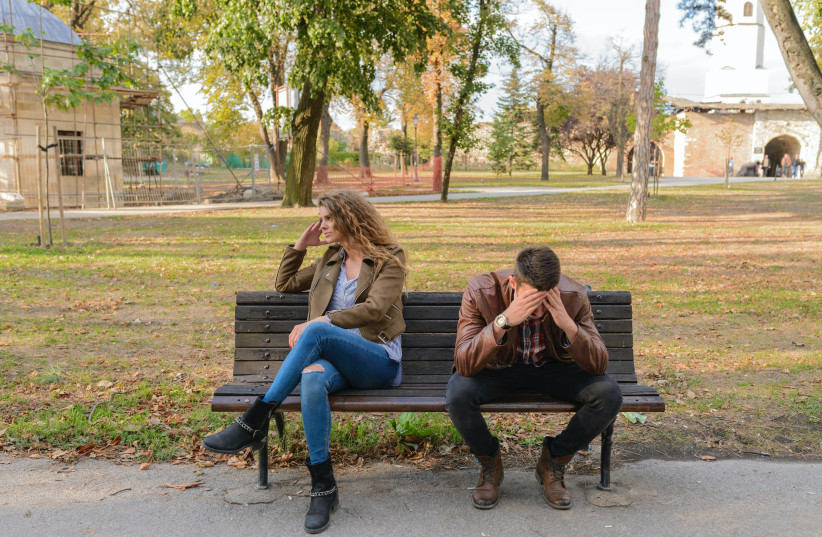Let's start with what's definite: feelings are the key to building a relationship.
We fall in love with someone, are excited to see and talk to them, feel safe with and talk to them and are excited to dream together about the future.
On the other hand, emotions are also the key to a bad relationship. A house that contains a lot of anger, frustration, helplessness, or distress is a place where the couple suffers.
What's less known but true is that many times, when a relationship isn't positive, the key to change is found in the emotional dimension. If we manage to change the way we feel in certain situations with our partner, we can also change the way we act and respond in our mutual space which will improve the relationship.
How do you change feelings?
Let's start with a dilemma. Avi leaves his parents' house in Kiryat Bialik as a passive person. Merav walks out in front of him with a tendency to criticize and a desire to control everything that happens in her life. What will happen when they meet together in their apartment in Netanya?

The answer is that after several years of stewing in silence, she'll attack him with unpleasant words and he won't respond, or he'll run away to a place where she isn't. This isn't a positive way to manage a good relationship.
Therapy can identify what mechanisms activate both of them and reflect to them the reasons for the way they act. This conversation can help them understand why they act the way they do and might spur them to take on a commitment to try to change it.
But how does this help Merav at the moment when her husband's passivity drives her crazy the next time? Will Avi feel hurt and gather inside himself the next time she yells at him? The answer is that it doesn't help, so sometimes therapy fails to provide long-term, and desired results.
Can Merav manage to be less angry with Avi and maybe even see the good in him and accept him as he is? Can Avi feel more secure in the face of Merav's attacks? This is the point where everything can change in the couple's space.
Often people go to couples therapy with the goal of moving from a situation of living in a bad relationship to living in a relationship that will at least be somewhat reasonable or pleasant. The problem in many cases is that people come to therapy that focuses on the mental space while the problem is in the emotional space.
Merav is angry and disappointed while Avi feels helpless. He would like to be stronger and give Merav what she wants from him but there is something blocking him from the inside. Maybe Merav also feels powerless because she's stuck in a relationship with a person who can't move and lead.
This can be discussed endlessly, but Avi's mechanism won't change, nor will Merav's attitude towards him. What can help here is to shift the emphasis of treatment from mental to emotional.
Emotional therapy enables work in three dimensions
Many treatment methods focus on the mental dimension. Talking, understanding, processing information. The point is that most of our problems aren't mental but emotional. For example, if we fail to return fire when we're attacked, it's usually due to some emotion that has settled in our system and prevents the words from being expressed.
To release a problem from our system we need to process information, and then lose it. For example, if our system stops associating an assault we experienced as a child with the situation of paralysis and shutting down systems, we start to express ourselves in situations where previously we couldn't.
To do this, focus on the emotional aspect. In other words, no emphasis is placed on our thoughts or actions, but on releasing the emotion that produces our thoughts and actions.
How do we know we've released a bug from our operating system? When we see that people start reacting to us differently. For example, if people were moving away from us and suddenly they came closer or if they were inclined to criticize us and suddenly it stopped; in other words, if we see a change in the behavior of others towards us, this shows that we have broken through with our inner work.
There is another way to check that therapy has worked: When we suddenly discover that we're less afraid, more confident and smiling at the world much more.
Our emotional change creates a change in our partner's behavior. A relationship is a zero-sum game. If one party behaves aggressively, another party enables this behavior. Each of our emotional changes allows us to express ourselves in a new way, in behavior and words, and forces the other party to respond to our change.
Returning to Avi and Merav, if Avi manages to release his distress in the face of his wife's criticism he will be able to start responding to her in a more powerful way. Then she will hear him, maybe for the first time in her life.
Then she'll have to respond to this change of his. Maybe she'll criticize him less, maybe she'll appreciate him more, etc. If Merav manages to get less angry then she can come to Avi from a place that allows more conversation and openness, and less (metaphorical) throwing of objects.
Either way, putting the spotlight on changing the emotions that activate us can help us form a positive, healthy relationship.
Gili Weintraub is an emotional therapist and creator of the 'couples therapy in half' method.
